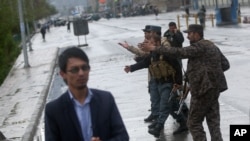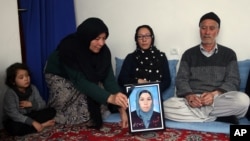The war in Afghanistan has long been a dangerous assignment for journalists, but groups say the country's deteriorating security situation is making things more dire, especially in areas held by the Taliban and Islamic State fighters where the government is struggling to regain control.
“The overall situation in the country is dire for everybody, but journalists are particularly affected,” Zia Bumia, president of the South Asian Free Media Association for Afghanistan and a leading member of the Afghan Journalists Federation, told VOA in a telephone interview.
The press rights group Reporters Without Borders (RSF) urged Afghan authorities this week to protect journalists in “war zones.” The group said the Taliban and Islamic State militants have increased threats against journalists.
“Reporters Without Borders is extremely concerned about the safety of hundreds of journalists and media outlets in a number of Afghan provinces as a result of an increase in attacks by the Taliban and Islamic State,” said RSF.
According to RSF, journalists working in the war zones are under pressure from both militants and local officials. The Taliban “accuse them of not being neutral," while local officials are wary of “exaggerating and portraying the situation in overly negative terms.”
‘Black holes’
“Despite courageous efforts by journalists to do their duty to provide news coverage, Afghanistan’s war zones – the provinces of Helmand, Kunduz, Baghlan, Nangarhar, Takhar, Ghazni and Farah – are in the process of becoming news and information ‘black holes’ in which media freedom is disappearing,” the RSF statement said.
Afghan journalist organizations have also voiced concerns that the increase in militants’ attacks, including the ongoing battles in southern Helmand province, is posing a serious threat to the safety of reporters.
“All of the journalists I have seen are worried,” Rahimullah Samander, head of the Afghan Independent Journalists Association told RSF.
“There is intense fighting in the three strategic provinces of Baghlan, Kunduz and Takhar. There are at least 50 local journalists and around 10 reporters working for national or foreign media in these provinces. The local journalists do not enjoy the support of national or foreign media and are less well regarded by military and political officials, who also accuse them of putting out alarmist reports.”
Spreading fear
Afghan security forces have been engaged in fierce battles against Taliban militants in southern Helmand province where the militants have captured several districts. The battles prompted the U.S. military to deploy around 100 troops to the provincial capital Lashkar Gah to assist Afghan forces in their bid to defend the increasingly besieged city.
“Security authorities just yesterday discovered and diffused a bomb planted outside the office of the Helmand Journalists Association,” a local journalist in southern Afghanistan told VOA in a phone interview on Thursday. “The association’s office was the target to spread fear among journalists.” The journalist spoke on condition of anonymity for safety reasons.
He said the Taliban militants have been dismayed with recent investigative media reports that exposed the presence of foreign fighters in Taliban ranks in Helmand.
According to the journalist, some government officials in southern provinces also create hurdles for reporters. “When the issue of ‘ghost soldiers’ in Helmand was reported by the media, the officials involved weren’t happy, for instance,” he said.
The situation in eastern parts of the country does not seem to be any different. IS militants have threatened many reporters in Nangarhar where the group has established a presence in several of its districts. “We fear IS. Many of us have been threatened by the group. They accuse us of not being neutral,” a local journalist in eastern Nangarhar’s capital Jalalabad told VOA.
Assurances of protection
The Afghan government has said it would take specific actions for the safety and protection of journalists in the country.
“The Afghan Journalists Federation has reached an agreement with the National Security Council called 'Procedure for the Safety and Protection of Journalists,'” said Bumia.
“The second vice president will chair a coordination committee to help implement the Procedure for the Safety and Protection of Journalists,” Bumia told VOA, adding that the committee would consist of high level Afghan security and judicial authorities and representatives from the Afghan Journalists Federation.
According to Bumia, the procedure includes the creation of a support fund to assist affected journalists and their families.
Afghanistan is ranked 120th out of 180 countries in RSF’s 2016 World Freedom Index. According to the Committee to Protect Journalists, 27 journalists or media workers have been killed in Afghanistan since 2001. Abdul Samad Rohani, a BBC reporter was abducted and murdered in Lashkar Gah in 2008. NPR photojournalist David Gilkey and Afghan journalist Zabihullah Tamanna were killed in Helmand in June.






